
- Aleksander Emelianenko Not Fighting in Korea
- Paul Buentello Reportedly Leaves Strikeforce, Heading To The UFC
- Evangelista vs Gurgel To Main Event Nov. 6 Strikeforce Challengers Event
- Full UFC 103: Franklin vs Belfort Bouts Confirmed
- 2-Time Olympian Daniel Cormier To Make MMA Debut At Strikeforce Sept 25
- Matt Hamill vs. Jon Jones In The Works For "TUF 10 Finale"
- Rick Story Reportedly In For Daley Against Brian Foster
- Gesias "JZ" Calvacante VS Daisuke Nakamura At DREAM 11
- Fight Card Set For "MFC 22: Payoff"
- Clementi vs. Duncan To Headline Cage Wars Championship
- On The Spot ~ Raffaello 'Tractor' Oliveira
- On The Spot ~ Carlos "The Natural Born Killer" Condit
- On The Spot ~ James Brasco
- Video: On The Spot ~ Roan Carneiro
- Jimi Manuwa ~ Becoming The Poster Boy
- Royce Gracie: I Give Them The Tools, The Rest Is Up To Them
- On The Spot ~ Gilbert Melendez
- Renato Sobral ~ It Speaks For Itself
- On The Spot ~ Denis Kang
- Introducing Mayhem Promotions
 On The Spot ~ Carlos "The Natural Born Killer" Condit
On The Spot ~ Carlos "The Natural Born Killer" Condit
posted by Matthew DeMarinis
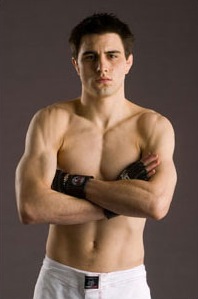 In 2006, Carlos “The Natural Born Killer” Condit entered "Rumble on the Rock 8" as an unknown 21 year-old fighter with a 13-2 professional record. Condit was expected to pad the record of some of the more well-known fighters in the tournament, but he quickly started dropping spectators jaws, as well as opponents. He kicked off his breakout performance by upsetting Brazilian born Renato Verissimo via strikes in just 17 seconds. He then moved on to defeat former UFC Welterweight title challenger Frank Trigg via armbar in just one minute and twenty-two seconds. Despite losing to a talented Cesar Gracie fighter, Jake Shields, in the finals, it was safe to assume that Condit had begun to make his impact on the sport. After his loss to Shields, Condit reeled off victories in eight of his next nine fights, including becoming the final welterweight champion in the history of World Extreme Cagefighting.
In 2006, Carlos “The Natural Born Killer” Condit entered "Rumble on the Rock 8" as an unknown 21 year-old fighter with a 13-2 professional record. Condit was expected to pad the record of some of the more well-known fighters in the tournament, but he quickly started dropping spectators jaws, as well as opponents. He kicked off his breakout performance by upsetting Brazilian born Renato Verissimo via strikes in just 17 seconds. He then moved on to defeat former UFC Welterweight title challenger Frank Trigg via armbar in just one minute and twenty-two seconds. Despite losing to a talented Cesar Gracie fighter, Jake Shields, in the finals, it was safe to assume that Condit had begun to make his impact on the sport. After his loss to Shields, Condit reeled off victories in eight of his next nine fights, including becoming the final welterweight champion in the history of World Extreme Cagefighting.
In April of 2009, he made his UFC debut against former middleweight contender, turned welterweight, Martin Kampmann at "UFC Fight Night 18." Condit and Kampmann treated the fans to a highly competitive and entertaining fight, and although the judges’ decision gave Kampmann the victory, it was by no means an underwhelming performance by Condit. Poised to both, make his return to the win column, and start his ascension through the UFC welterweight division, “The Natural Born Killer” will be taking on UFC newcomer Jake Ellenberger (21-4 MMA) at "Ultimate Fight Night 19" on Sept. 16 in Oklahoma City, OK. Last week, Carlos took some time to sit down with MMA Spot's Matthew DeMarinis to discuss his new camp, how he gets his mind right for fighting, what part of his game has improved the most, and also how he would approach a fight with UFC Welterweight Champion Georges “Rush” St. Pierre.
MD: How are you doing today, Carlos?
CC: I’m doing well.
MD: In three weeks you’ll be taking on Jake Ellenberger at "Ultimate Fight Night 19." How is the preparation going for the fight, and are you anxious to get back in the cage?
CC: Preparation is going really well. It’s been a really tough training camp. I think we got a lot done and I really feel like I’ll be prepared in a few weeks. I am very excited to get back in the cage. I’m coming off a loss, and I want to get back in there, and get back on the winning track.
MD: Your original opponent was Chris Lytle, but he had to pull out after suffering a severe knee injury, now you’re facing Ellenberger. Is it a difficult to transition from training for a boxer with a Brazilian jiu-jitsu black belt to a power wrestler like Ellenberger is? Or do you train the same way every time?
CC: I’ve pretty much been working to improve the same things that I have been when I was training for Chris, so not a whole lot has changed. Just a little bit of game planning stuff has changed, but that’s about it.
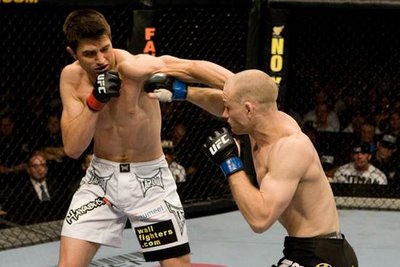 MD: With all of the attention surrounding the UFC, do you feel you’re now fully adjusted and comfortable with it, or is it not much different than it has been throughout your career?
MD: With all of the attention surrounding the UFC, do you feel you’re now fully adjusted and comfortable with it, or is it not much different than it has been throughout your career?
CC: Well, I have yet to make a big name for myself in the UFC. I haven’t had a win yet, but I fought in the WEC and had quite a bit of success there. There’s more attention to the UFC, definitely.
MD: How did you get started in MMA? What made you decide that you wanted to do this?
CC: I started wrestling when I was about nine-years old, which was around the same time that the UFC came out. I remember my wrestling coaches were watching the first couple UFC’s, I saw that and I was hooked. When I was in high school, I looked in a phone book, found a gym and started training.
MD: Who did you start training with, and what motivated you to make a career out of this?
CC: I started training out of Tom Vaughn’s gym in Albuquerque, New Mexico. He was in partnership with Greg Jackson at the time. When I first started, most people, even the top level fighters weren’t making a living doing this, because it was still during the dark ages. I didn’t know if I was going to be able to make a living, or be very successful doing this. I just did it because I like it.
MD: How long have you been doing it full-time?
CC: I would say about three years, probably.
MD: At what point in your career did you feel that you could compete at an elite level in this sport? One day did it just click for you, or at what point in your development did you say, ‘I can be a champion level fighter in this sport’?
CC: When I was real young. The gym I was training at was also in partnership with Greg Jackson’s gym, I would train with some really tough guys like Diego Sanchez. I would have really good sessions with guys like that, and I know that if I could compete and do well against guys like that then I could definitely compete on the world stage.
MD: When you first started, what aspect of the sport were you strongest at? What area did you feel needed the most improvement?
CC: When I first started I had a pretty good wrestling base, but I would say probably my striking. I was always kind of a natural striker and was always a scrappy kid. I don’t know, when I first started out my wrestling was pretty tough and my striking was good, but I worked on my jiu-jitsu quite a bit and my wrestling had gone down, so I would that’s what I needed the most work on.
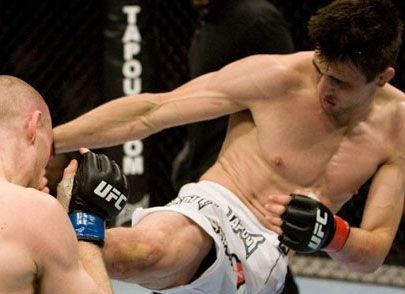 MD: At "Rumble on the Rock 8" you entered a super-stacked tournament. Some, now legendary, fighters participated in that. What was your mindset going into that? Did you think you could make a big impact, and what is your mindset now, knowing how well you performed in that tournament?
MD: At "Rumble on the Rock 8" you entered a super-stacked tournament. Some, now legendary, fighters participated in that. What was your mindset going into that? Did you think you could make a big impact, and what is your mindset now, knowing how well you performed in that tournament?
CC: Going into that tournament I was the underdog. I was seen as a “soup can”, someone to just toss to the more well-known fighters to get them a win. For me, my mindset was that I had nothing to lose. I could go in there and fight my ass off no matter what happened. I was expected to lose anyway, so it didn’t matter. Since then it just reaffirmed what I knew, that I was a top-notch fighter.
MD: Were you confident going in that you could make an impact?
CC: Yeah. I knew the skills that I had, but until you step up in competition like that you never know.
MD: You recently switched camps and joined Arizona Combat Sports. What was the driving force behind your decision to move to Arizona, and join with ACS?
CC: It was a number of factors. Some of it was training and needing to get out train with different guys and get different looks. Part of it was personal. I had been in Albuquerque all my life, and I just needed to strike out and see different places. Get out of my same old rut.
MD: What area have you seen the most improvement in since you started training with ACS?
CC: My wrestling has definitely come a long way. My takedown defence has definitely improved, but overall I think my athleticism and my strength have definitely come a long way since I’ve been out here.
MD: At ACS, who has helped you the most? Who is your number one training partner that pushes you the hardest?
CC: Ah man, that’s hard. I’d probably have to rattle off a few names. If I said one without saying the other it would kind of be unfair. I have a lot of guys who help me out. Probably who’s helped me out with the wrestling is Aaron Simpson. He’s fighting in the UFC this coming weekend against Ed Herman. He’s a real tough dude. Also Steve Steinbeiss and Ryan Bader have helped me out quite a bit, along with C.B. Dolloway, and Jamie Varner.
MD: Most you guys at ACS are still young and talented. Who is someone that hasn’t been getting a lot of attention, but should be? Who is the up-and-comer that we should all start watching out for?
CC: There’s a kid over here, he’s about 21 or so, his name is Jacob McClintock. He is a very, very talented grappler, and I think he’s probably going to make big waves.
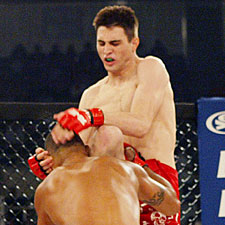 MD: Who would like to fight at this point in your career? What is your dream fight?
MD: Who would like to fight at this point in your career? What is your dream fight?
CC: I get asked that question a lot, and I don’t know man. There are so many tough dudes in the UFC, let alone the welterweight division throughout the world. It’s really hard to choose. Style-wise, maybe a guy like Nick Diaz, because he likes to stand, he’s got good jiu-jitsu, he’s well-rounded and likes to bring it.
MD: How many weight classes could you realistically com- pete in, and has the UFC talked to you about moving up or down for some exciting matchups in various weight classes?
CC: There hasn’t been any talk of me moving. When I was younger I fought at 155, but that was a rough weight cut for me. I’m just a lot healthier at 170. I’ve gotten to be a bigger 170-pounder, and I could theoretically compete at middleweight I guess, but I think that welterweight is perfect for me.
MD: Do you think the sport would benefit from having five-round fights without the need for titles and interim titles being put on the line?
CC: Yeah, I think a lot of fights go to a decision, and people feel like it’s unresolved. Fights are so close that a decision doesn’t do it justice, so I think five-round fights would kind of remedy that. On the other side of that though, if you’ve got guys fighting five rounds instead of three rounds, I think you should pay them more. More work, more pay.
MD: You said after your lost to Kampmann that you understood the judges’ decision. Do you feel any differently today knowing now that he’s one win away from a title shot?
CC: No, I’m not going to take anything away from Kampmann. He fought a good fight that night, and he was able to maintain dominant position for a enough of the time to get the judges’ nod. That again goes to the judging thing. When fights come down to judges, it’s usually a controversial decision.
MD: Where do you feel you stack up in the current welterweight division in the UFC? Knowing Kampmann is one win away from a title shot and you two had a very close fight, where do you think you sit in the rankings in the UFC?
CC: I don’t know. I’m going to wait to answer that until after this fight, after I get a win under my belt. I’m 0-1 in the UFC so far, so I don’t have the right to really be squawking a whole lot. Let me do my talking with my fists here on the 16th, and that will be a better gauge to where I’m at.
MD: Seeing that Georges St. Pierre has run through most of the top welterweight contenders throughout his career, who do you feel has the best chance to dethrone him right now?
CC: You know, not only is GSP a killer athlete, and a killer fighter, but he’s also very smart. He’s a tactician. That’s a big part of his game, using strategy. Fitch looked very, very tough in his last fight, and even though that fight [GSP-Fitch] wasn’t very close, I don’t know. Honestly, I don’t know who could take GSP right now.
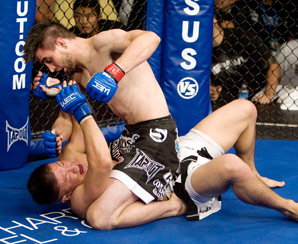 MD: How would you approach a fight with him? If the UFC called you after your fight with Ellenberger and told you they were giving you a title shot, how would you approach a fight with him, and what do you feel are some of his weaknesses that you can exploit?
MD: How would you approach a fight with him? If the UFC called you after your fight with Ellenberger and told you they were giving you a title shot, how would you approach a fight with him, and what do you feel are some of his weaknesses that you can exploit?
CC: I would try to make it a fast-paced fight. I would really try to take it to him right off the bat and try to avoid takedowns. He’s a phenomenal wrestler, so that could be a tough task, but I’d try to sprawl and brawl. Also just push the pace, continue to try to break him mentally, I don’t know if that’s a possibility, but that would be my approach. In his recent fights he’s really just dominated the pace, controlled the pace of the fight, and I think if someone were to take him out of his game plan that would be the opportunity to take the win from him.
MD: If you weren’t doing mixed martial arts, what sport do you think you would be playing right now?
CC: I would maybe be a tri-athlete, or possibly a runner; maybe even basketball. I never really got into those sports, I was more focused on the contact sports. I have a short attention span, so I have to mix it up a little bit.
MD: What are some things you like to do when you aren’t training?
CC: I like to hang out with my friends, I have a couple of buddies that I’ve known for a very long time. I like to fish quite a bit, I got into fly fishing recently. I like to barbeque, cook, and I like to eat bomb-tasting healthy food and cooking it up for my friends and family.
MD: How’s the fly fishing going for you?
CC: I enjoy it man. I like being outdoors. It’s a lot of fun.
MD: Do you think any of this stuff you like to do outside of training helps you focus mentally? Do you think it puts you in the right mental state for when you get back in the gym? Maybe just a subtle difference that you don’t even realize, but something that helps you as an athlete?
CC: Oh without a doubt. Some guys like to constantly think about the fight. They basically like to live in it 24/7. For me, I train so hard and think about so much while I’m at the gym and while I’m training, that I need an escape. I need to clear my mind, and think about something else other than the upcoming fight.
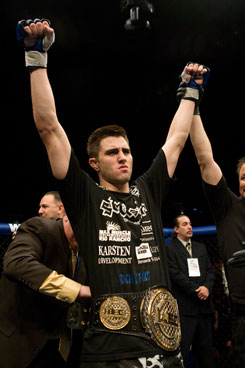 MD: "ADCC 2009" is ten days after your fight at "UFN 19." Have you been asked to compete in that? Would you compete in it knowing that it’s ten days after your fight, and you might be a little banged up afterwards?
MD: "ADCC 2009" is ten days after your fight at "UFN 19." Have you been asked to compete in that? Would you compete in it knowing that it’s ten days after your fight, and you might be a little banged up afterwards?
CC: Somebody sent me an invitation through my email. I don’t know if I will be able to compete in that one, because like you said, I might be a little banged up from my fight, but I haven’t competed in a grappling tournament in a while and that’s something that I think I want to get back into. My fights in the UFC are so far in between that having something in there to get the competitive juices flowing would be good.
MD: So that’s something you would like to do in 2011, possibly?
CC: Yeah, possibly. Maybe I’d start with some smaller tournaments to see how I do, and just go from there.
MD: Is there anyone you would like to thank right now, sponsors, coaches, trainers?
CC: I’d like to thank Tapout. They’ve been a great sponsor for me. Everybody at AZ Combat. I’d like to thank all of my friends and family that support me. My wonderful girlfriend, we’re expecting a kid here in a couple months, so I’m pretty excited about that, and everybody back home in Albuquerque.
MD: Well, good luck in a couple of weeks with Ellenberger, and thanks for sitting down with us.
CC: Cool man, no problem.
Posted at 09-07-2009
